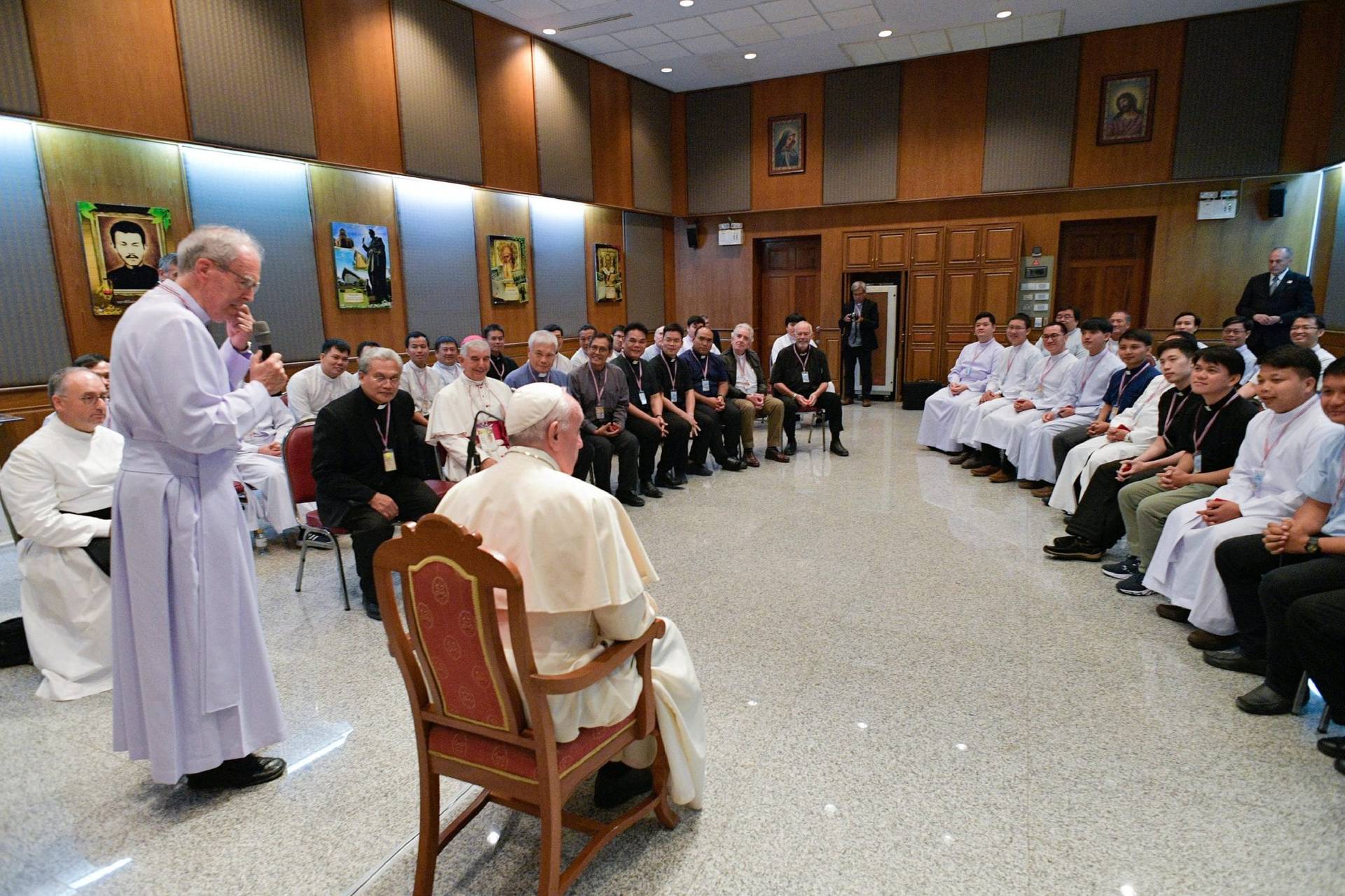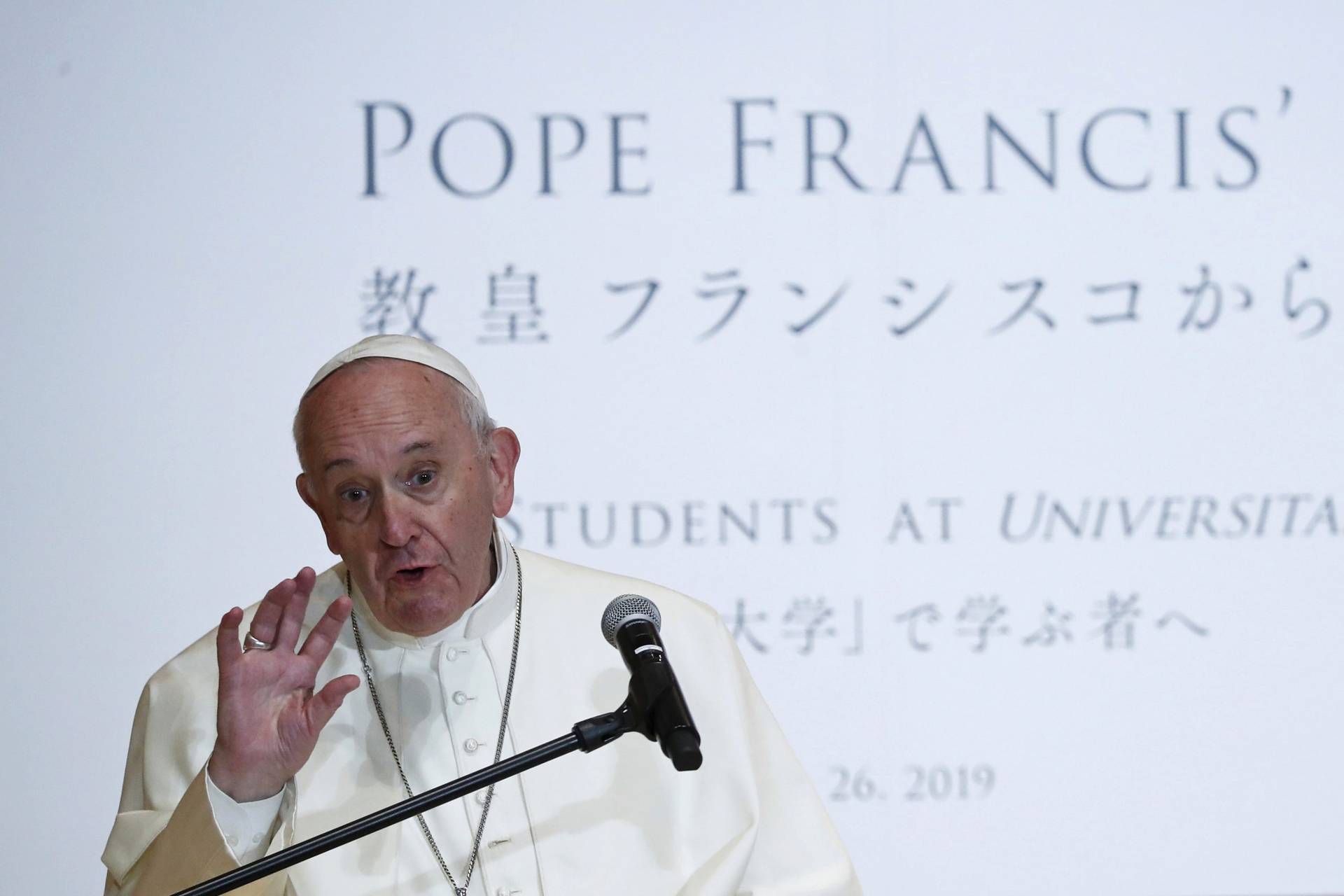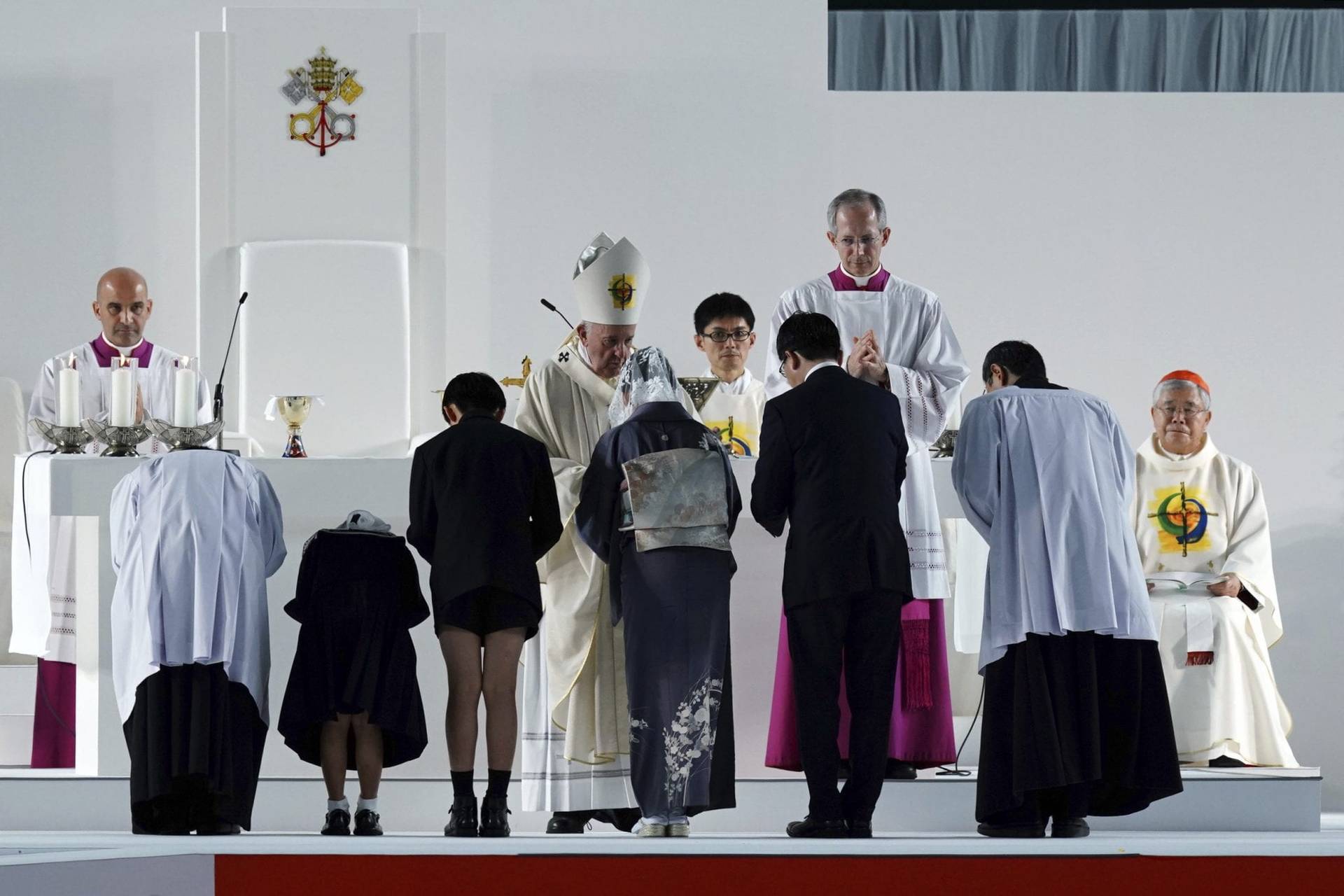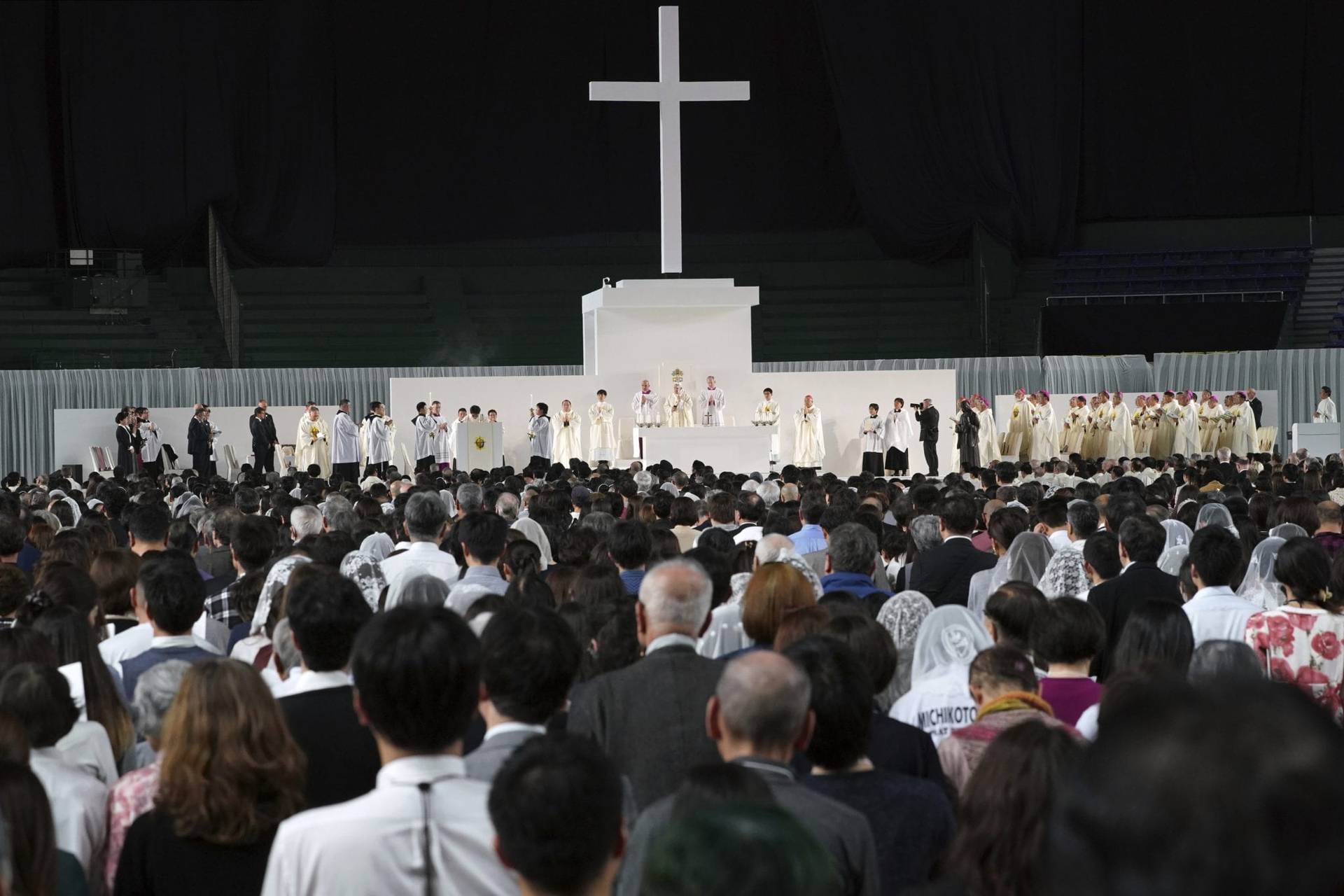ABOARD THE PAPAL PLANE – Pope Francis said Tuesday that the latest round of financial scandal at the Vatican is actually a success story, because the situation was revealed thanks to an internal Vatican probe, which he said demonstrates that new controls are working.
The pontiff also called both owning and deploying nuclear weapons “immoral,” saying that point should be added to the Catholic catechism, and suggested that it might be time to re-think the veto power wielded by a handful of countries in the United Nations Security Council.
His comments came during an airborne news conference on the return flight to Rome from his Nov. 19-26 trip to Thailand and Japan.
Vatican financial scandals
“There is corruption,” Francis conceded when asked about a recent scandal pivoting on the purchase of a former Harrod’s warehouse in London’s tony Chelsea neighborhood by the Vatican’s Secretary of State, using funds from the annual “Peter’s Pence” collection presented as a way to support papal charities.
Initially around $220 million was spent acquiring a share of the property, and later the Secretariat of State attempted to lay out another $170 million to buy it outright. According to the Italian magazine L’Espresso, the Vatican was overcharged for the operation by several Italian middlemen.
Five Vatican employees were suspended following a raid by the Vatican gendarmes on Oct. 1 of their offices, including members of the Secretariat of State and the director of the Vatican’s Financial Authority (AIF). Two weeks later, Domenico Giani, the Vatican’s longtime security chief and Francis’s personal bodyguard, resigned over the leak of the document related to a magistrate’s investigation of the deal.
During the hour-long press conference, Francis said that the five Vatican officials suspected of corruption will soon be questioned by the promoter of justice, if the process hasn’t actually started already.
“They have done things that do not look clean,” Francis told reporters on Tuesday. “But the allegation didn’t come from outside. This reform of the economic methodology had begun with [Pope] Benedict XVI and continued.”
It was the Vatican’s auditor general, he said, who noticed that there was something shady in the accounts and brought a written allegation to the pope, asking Francis what to do. The pope said he directed him to the Vatican’s promoter of justice.
“I was happy because this means that today the Vatican’s administration has the resources to bring light to the bad things that happen inside,” he said. “There were cases of corruption.”
(The current auditor general, Italian layman Alessandro Cassinis Righini, serves in an interim capacity. He took over when his former boss, Italian financial expert Libero Milone, left in 2017 claiming he’d been forced out because of efforts to expose suspect deals.)
Francis said there’s a presumption of innocence for the five people involved, but in any case the money wasn’t properly administered.
Francis defended the use of funds from the Peter’s Pence, saying that to “put money in a drawer” is not to administer it wisely.
It’s smart to invest it, he said, to guarantee that capital doesn’t lose its value. However, the money has to go to safe and moral projects, he said and not to a “weapons manufacturer.” Investments also have to be short-term, so that money is spent within the year when new donations come in.
Francis said that it’s licit to use the fund to buy a property, then rent it and sell it again, without actually naming the London property. However, he said, “Afterwards, what happened, happened. A scandal.”
The fact that corruption took place in the Vatican, he said, is “ugly,” but he again stressed that the system itself found it.
“I thank God, not for the fact that there is corruption in the Vatican, but because the internal system works,” he said.
Looming large, though never actually mentioned during the presser, was the name of Rene Brülhart, a Swiss lawyer and anti-money laundering expert who left the post of president of AIF just before the trip to Thailand and Japan. His exit has been variously described as the normal end of his term of office, a resignation in protest, or a firing.
Francis said he had summoned the “president of AIF,” who handed in his resignation.
“It was AIF, it would seem, that didn’t control the crimes of others,” Francis told journalists.
The pontiff insisted that progress has been made when it comes to Vatican finances, citing the fact that the so-called Vatican bank today can operate like any other bank in the world, something that wasn’t possible a year ago, when many financial institutions didn’t recognize it.
Francis also referred, after being asked, to the Egmont Group, a global network of financial intelligence units. Though recognized internationally, the group has no regulatory authority. According to the pope, this is a task for Moneyval, the Council of Europe’s anti-money laundering agency, which is expected to release its latest report on the Vatican in early 2020.
The pope also said Brülhart had requested the return of documentation seized by the Vatican’s security forces at the request of the Egmont Group, but said this cannot be done.
“I asked an Italian judge what justice needed to do,” Francis said. “Justice, after an accusation of corruption, is sovereign in a country.”
After insisting that he would like the five suspects of corruption to be found innocent, the pope underlined that “the lid was lifted off the pot from the inside,” and praised the courage of the auditor general to write an allegation against five people.
Regarding the Egmont Group, Francis said that he didn’t want to offend them because they “do a lot of good,” but in this case, “sovereignty is more important than private interests.”
On nuclear weapons and nuclear power
Several questions turned on nuclear weapons, nuclear energy and St. Thomas Aquinas’s principle of just war. Peace today, Francis said after a question from a French journalist, “is weak, very weak.”
Prompted by a Japanese journalist who asked about what the pope felt when visiting Hiroshima and Nagasaki, he recalled that he had condemned the use of nuclear weapons “as immoral.”
“This has to go to the Catechism,” the pope said. “And not only the use of them, but having them.”
Possessing such weapons, he said, is dangerous, because accidents happen but also because “the craziness of one can destroy humanity.” He quoted Albert Einstein, who said that the fourth world war will be waged with “sticks and stones.”
Regarding nuclear power plants, Francis insisted on the possibility of an accident, something Japan was privy of due to the 2011 triple disaster, meaning the earthquake, tsunami and meltdown of the Fukushima nuclear plant that resulted from the previous two.
Nuclear power, he said, “is the limit.” Nuclear weapons “are destruction,” but the use of nuclear energy is “at the limit” because “we still haven’t achieved total security” for its deployment.
Underlining that it was a personal opinion, Francis said that he wouldn’t use nuclear power until such security is achieved to prevent the disaster it can cause for humanity and also the environment.
Asked about a rumored papal encyclical on violence, the pontiff said that the idea is “in a drawer,” but that he doesn’t feel like the issue has matured enough to write it himself, in addition to a lack of time.
The pontiff said that while international organizations such as the United Nations have done much good, they haven’t been able to control weapons.
“If there’s a problem with safety, with weapons, and all countries vote yes [to control them] and one with a right to veto says no, then it’s stopped.”
“I have heard, I’m not capable of judging if it’s good or not, but perhaps the United Nations should renounce to some nations in the Security Council having a right to veto” he said. “Everything that is done to stop the construction of weapons, to stop war, to go through negotiations,” he said, “must always be done.”
Latin America in flames, and “I love China”
Asked to share his thoughts about the protests in Hong Kong, Francis said it’s far from being the only place with long-lasting unrest. He mentioned Chile, the yellow vests in France, and Nicaragua and other countries of Latin America, “such as Brazil,” with similar situations.
“I ask for peace in these countries that have problems,” he said, adding that it’s necessary to call for dialogue.
A journalist asked Francis if he wanted to visit China, and he said that he would very much like to visit Beijing because “I love China.”
Spanish-speaking journalists zoomed in on the pope’s home continent, with a journalist mentioning upheaval in Venezuela, Bolivia, Chile and Nicaragua, including churches being burned or attacked.
Francis said he didn’t feel like he could give an analysis, but quoted “someone” suggesting to him that the situation is not much different from the 1970s and 1980s, when Chile, Argentina, Uruguay, Paraguay and Brazil had all military governments and a situation that was “in flames.”
The pope said the situation in Chile frightens him in particular, because it’s coming out of “a problem of [clerical] abuses which made us suffer a lot, and now [there’s] a problem of a kind we do not understand well but it is in flames.”
Francis said he hasn’t yet found a good analysis of the situation in Latin America, but said there are “weak, very weak governments, that have not yet been able to bring peace.”
Follow Inés San Martín on Twitter: @inesanma
Crux is dedicated to smart, wired and independent reporting on the Vatican and worldwide Catholic Church. That kind of reporting doesn’t come cheap, and we need your support. You can help Crux by giving a small amount monthly, or with a onetime gift. Please remember, Crux is a for-profit organization, so contributions are not tax-deductible.














